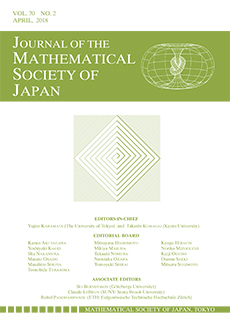Abstract
We consider Schrödinger equations $i\partial_t u = (-\Delta + V)u$ in ${\mathbb R}^3$ with a real potential $V$ such that, for an integer $k\geq 0$, $\langle x \rangle^k V(x)$ belongs to an amalgam space $\ell^p(L^q)$ for some $1\leq p$ < 3/2 < $q \leq \infty$, where $\langle x \rangle=(1+|x|^2)^{1/2}$. Let $H = -\Delta + V$ and let $P_{ac}$ be the projector onto the absolutely continuous subspace of $L^2({\mathbb R}^3)$ for $H$. Assuming that zero is not an eigenvalue nor a resonance of $H$, we show that solutions $u(t) = \exp(-itH)P_{ac}\varphi$ admit asymptotic expansions as $t \to \infty$ of the form
$$\bigg\| \langle x \rangle^{-k-\varepsilon} \bigg( u(t)- \sum_{j=0}^{[k/2]}t^{-\frac32-j}P_j \varphi \bigg) \bigg\|_{\infty} \leq C |t|^{-\frac{k+3+\varepsilon}2} \big\| \langle x \rangle^{k+\varepsilon}\varphi \big\|_1$$
for 0 < $\varepsilon$ < $3(1/p-2/3)$, where $P_0, \dots, P_{[k/2]}$ are operators of finite rank and $[k/2]$ is the integral part of $k/2$. The proof is based upon estimates of boundary values on the reals of the resolvent $(-\Delta -\lambda^2)^{-1}$ as an operator-valued function between certain weighted amalgam spaces.
Citation
Artbazar GALTBAYAR. Kenji YAJIMA. "Resolvent estimates in amalgam spaces and asymptotic expansions for Schrödinger equations." J. Math. Soc. Japan 65 (2) 563 - 605, April, 2013. https://doi.org/10.2969/jmsj/06520563
Information





